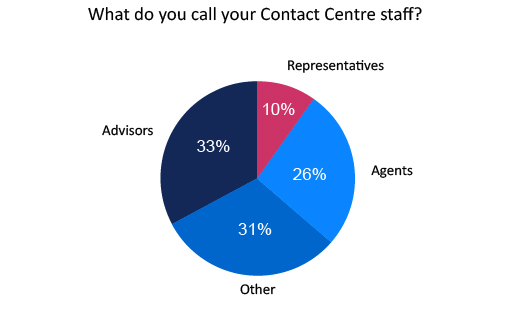A recent Call Centre Helper poll found that 31% of companies call their frontline staff something other than agent, advisor, representative, or executive.
As job roles evolve and responsibilities expand, many businesses are rethinking titles to better reflect the value and complexity of their staff’s work.
In this article, we explore why call centre job titles matter and what alternatives might be the best fit for your team.
Call Centre Job Titles
Many companies traditionally use the term “Call Centre Agent,” but as roles evolve, businesses are adopting a wide range of alternative titles to better reflect the responsibilities of their teams. Other names include:
- Ambassador
- Agents
- Advisors
- Associate
- Business Development Officers
- Communications Professional
- Customer Account Manager
- Customer Advocate
- Customer Care Representative
- Customer Champion
- Customer Experience Advisor
- Customer Service Agent
- Customer Service Officers
- Customer Service Representative (CSR)
- Customer Support Specialist
- Detective
- Ninja
- Officer
- Partner
- Representatives
- Sales Advisor
- Sales Consultant
- Team Member
- Telephone Sales Representative (TSR)
- “The Team”
So, with all of these options, which job title should be implemented in your call centre?
“Agent” used to be the generally accepted term for such workers, but now, according to our poll, only 26% of businesses still refer to their frontline staff by this name.

Why Are People Moving on From the Title “Call Centre Agent”?
The title “Call Centre Agent” has long been the default, but many now see it as outdated. Richard Kenny, explains that “the term is a little bit generic and it does not reflect the increasing difficulty of the jobs people are doing.”
In other words, the title can feel dismissive of the skills and responsibilities the role actually requires.
Martin Hill Wilson, founder of Brainfood Consulting, shares a similar view, noting that “titles are most powerful when they describe the essence of the job undertaken.”
He points out that the word “agent” carries mixed associations, “travel agent, secret agent or an MBA course in which the budding star is encouraged to be an ‘agent of change’” – none of which truly capture the complexity of frontline contact centre work.
Both perspectives highlight the need for job titles that frontline staff can wear as a “badge of honour.”
Alternative Titles for Frontline Roles
Communications Professional
Instead of “Agent”, Janette, one of our readers, recommends “Call Centre Communications Professional. With this title the ‘agent’ can work in customer service operations, sales operations or on a help desk, i.e. one title fits all.”
However, there are many other benefits to this title. “It covers phone work as well as email and white mail now dealt with by many contact centres.
It helps encourage managers and the ‘agents’ to think of them as Professionals with a capital ‘P’ rather than ‘cannon fodder’ or ‘bums on seats’.” The title also “focuses the mind on the ‘communication’ side of the job… which looks good on a CV.”
Customer Care Representative
The title Customer Care Representative highlights “their real role, which is not just service but caring for customers,” as suggested by a contributor from the Forum.
It places emphasis on empathy and support, reminding staff that their job goes beyond transactions to truly looking after the customer.
Telephone Sales Representative
Another organisation shared that they had “undergone discussion as to a new name for frontline staff, [changing the job title to] Telephone Sales Representative,” moving away from the older title of Inbound Sales Representative (ISR).
This shift better reflected the seasonal nature of their business, where staff handle both inbound calls and outbound sales depending on demand.
Customer Service Advisors
The term Customer Service Advisor has become one of the most popular alternatives to “agent.” It suggests a more professional, supportive role, while also helping to clarify responsibilities.
However, in some industries it can cause confusion. For example, in financial services, the word “advisor” may imply a level of qualification that staff do not hold, which can create regulatory issues.
How to Choose the Right Job Title
Try to Add Individuality
Richard Kenny argues that the title “call centre agent” is too generic, noting: “I don’t think there is a ‘one size fits all’ answer here. It sometimes depends on the job that people are doing or the vertical that you are working in.”
This highlights the importance of tailoring job titles to reflect specific responsibilities. Even small differences in roles can warrant different titles, helping staff feel valued rather than grouped under one broad label.
When it makes sense to use the same title across a group, choose one that recognises the professionalism of the role.
Be Careful About Using “Advisor” in Financial Services
Whilst “Customer Advisor” is now the preferred title for frontline workers, according to our poll, there are reasons to and circumstances in which you should avoid using the term.
Not only does it bracket a number of workers in a similar fashion as “agent” does, it can be a precarious term to use in some business sectors.
Janette explains that “Customer Advisor” “is a dangerous title to use if your contact centre works in or for the Financial Services industry and especially if your business conducts sales on a non-advised basis.
Advisor suggests that the ‘agent’ is not qualified to give advice and giving advice is not permissible under the FSA regulations relating to non-advised sales.”
This example demonstrates the need for your frontline workers to have a job tittle that has clarity, as well as having individuality and the capability to empower the holder.
If you want more information on job roles in a contact centre, read these articles next:
- Typical Roles in a Call Centre – With Job Descriptions
- Skills and Competencies for Roles in The Call Centre
- How to Define Career Paths in Your Contact Centre
Author: Jonty Pearce
Reviewed by: Hannah Swankie
Published On: 11th Jan 2017 - Last modified: 18th Aug 2025
Read more about - Expert Insights, Editor's Picks, Employee Engagement, Empowering Agents, Martin Hill-Wilson, Motivation, Poly, Richard Kenny, Team Management

















